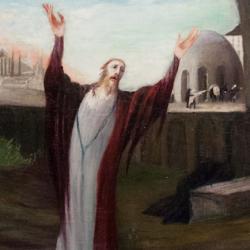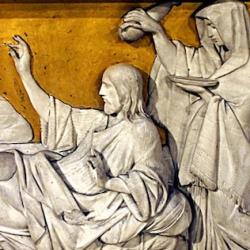INTRODUCTION
John and Jesus both preach repentance and coming judgment; both offer both oppose the Pharisees and Sadducees; both are prophets. Wrath is coming on Israel (Matthew 3:7), and the Lord sends a double witness to warn Israel.
THE TEXT
“In those days John the Baptist came preaching in the wilderness of Judea, and saying, ‘Repent, for the kingdom of heaven is at hand!’ . . . ” (Matthew 3:1-17).
BAPTISM IN THE WILDERNESS
John is the voice crying in the wilderness (v. 3; Isaiah 40:3), announcing the end of Israel’s exile. He baptized in the wilderness (v. 1) and at the Jordan (v. 5) because his baptism ritually enacts that return; those baptized by John cross the Jordan from exile back into the land (cf. Ezekiel 36). John also announces the coming of Yahweh (v. 3), and urges the Jews to prepare for their King’s arrival by cleaning up.
When the King comes, He will burn in wrath against Israel’s sins, and chop down all the haughty trees (v. 10). John alludes to Psalm 74, which describes the destruction of the temple as the devastation of a forest; and he alludes to Isaiah 10:15-19, which describes Assyria as Yahweh’s axe. Another Gentile power threatens Israel, and John calls Israel to repentance before it is too late. But John knows that he is only the beginning. Another is coming who will baptize with the Spirit and fire, and who will remove whatever chaff remains after threshing (vv. 11-12).
FULFILLING ALL RIGHTEOUSNESS
Jesus comes to John for baptism (v. 13), and John objects that Jesus should be the one baptizing. Jesus insists that righteousness must be fulfilled (v. 15). The vast majority of Matthew’s uses of the verb “fulfill” have to do with the fulfillment of prophecy (cf. 2:15, 18, 23), and that is likely what Jesus is referring to here. He consciously, and obediently, conforms to the will of His Father by fulfilling prophecy.
“Righteousness” in the prophets, however, not only refers to personal morality, but to God’s establishment of right order and justice (cf. Isaiah 51:4-8). In submitting to baptism, Jesus becomes the Spirit-filled instrument for establishing God’s righteousness (cf. Isaiah 11:1-10).
HEAVEN TO EARTH
As Jesus is coming from the water, the heavens open (v. 16). In Jesus, heaven and earth, estranged since Adam’s fall, are rejoined (cf. Matthew 28:18). The agent for joining heaven and earth is the Spirit, who descends on Jesus in the form of a dove (v. 16). The dove hints at Noah’s dove, which flew over the waters of the flood and brought news of new life on earth. Ultimately, the dove hovering over Jesus alludes back to Genesis 1:2: In Jesus the new creation is taking form through the brooding of the Spirit.
The Father speaks from heaven to identify Jesus as Son and Servant (v. 17). The Father’s announcement conflates Psalm 2 and Isaiah 42: Jesus is the Royal Son, the Davidic King and new Adam, who will be installed on Zion, and He is the Servant of Yahweh, whose suffering will bring redemption to His people.











